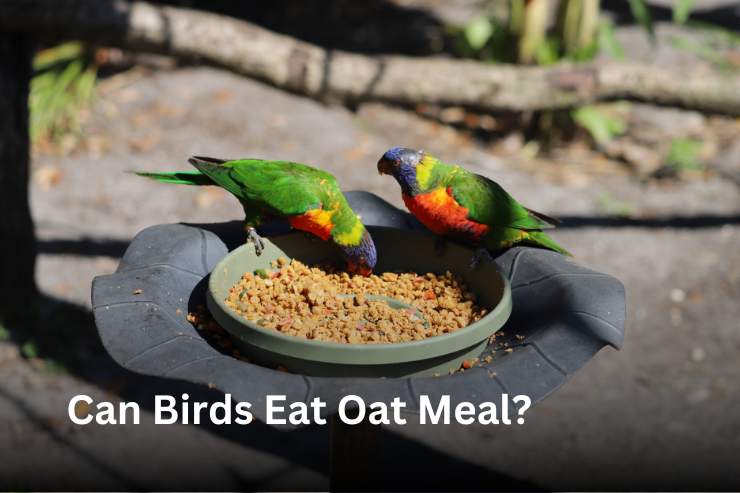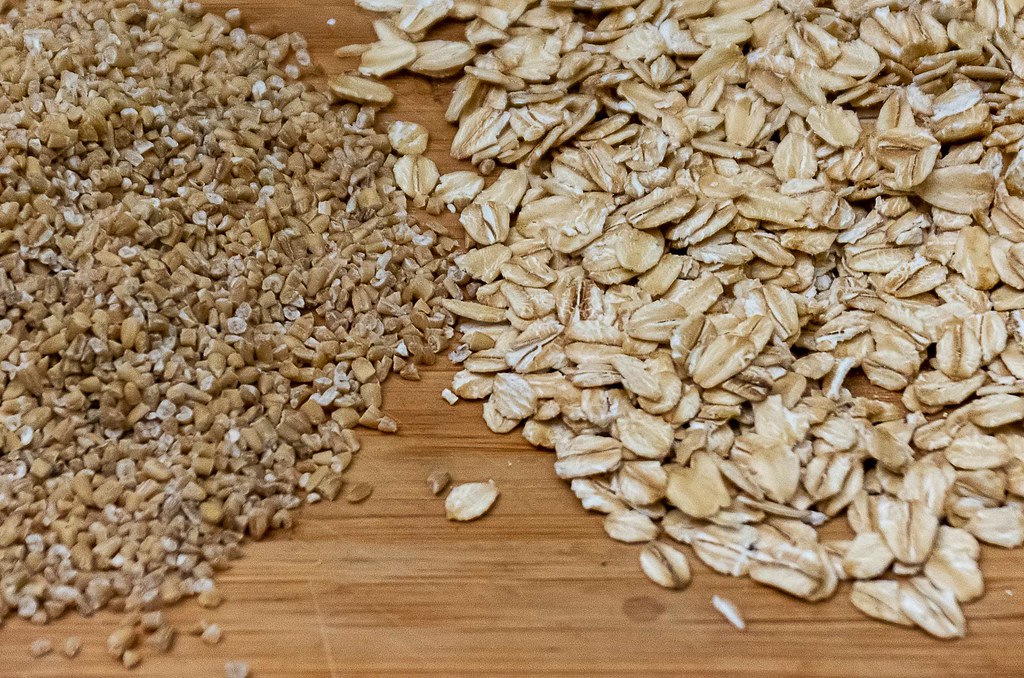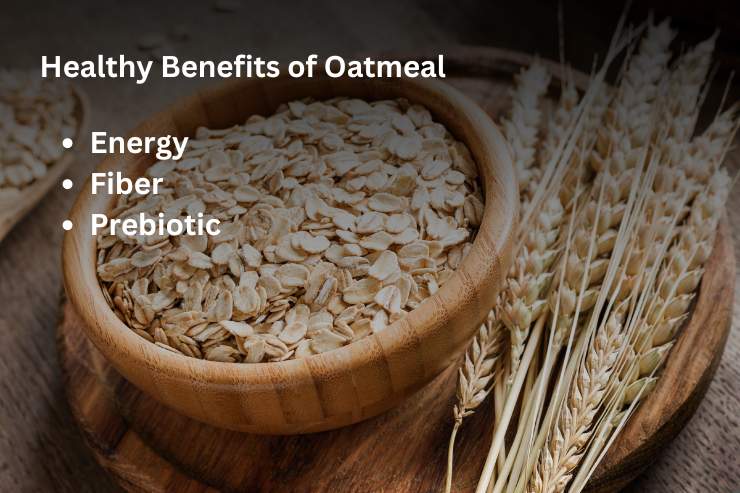Can Birds Eat Oat Meal?

Have you ever wondered if it is okay to share your morning oatmeal with your feathery friends?
You are not alone! As a bird lover, you want to ensure that your feathered friends receive the best possible nourishment when you feed them.
Birds are recognized for their varied and fascinating diets, which range from nectar-sipping hummingbirds to carrion-eating vultures.
One intriguing finding is how versatile many bird species are in their feeding habits. They frequently combine a variety of foods available in their surroundings.

This adaptation raises a curious question: Can birds eat Oatmeal? Oatmeal is commonly mentioned as a nutritional option for backyard bird feeders.
In this post, we will look at whether Oatmeal is a safe and helpful food for birds, analyzing both the potential benefits and the key factors to keep our feathery friends healthy.
Overview of Oatmeal
Oatmeal is a dehusked, steamed, and flattened oat product, as well as coarse flour made from hulled oat grains that have been milled, rolled, or steel-cut.
Each type of oatmeal has a slightly varied texture and cooking time, but all preserve the essential nutritional benefits of oats.
Nutrition Composition
Oatmeal is known for its high nutritional value, making it an excellent complement to both human and animal diets.
It is mainly made up of oats, a cereal grain rich in carbohydrates, fiber, and other critical elements.
Oatmeal is high in fiber, specifically beta-glucan, which improves digestion and regulates blood sugar levels.
Oats also include several critical vitamins and minerals, such as B vitamins, iron, magnesium, and zinc.
Potential Benefits of Feeding Birds Oatmaels
Oatmeal is not only a healthy morning dish for humans; it also delivers nutritional benefits for our feathery friends.
Energy and warmth
The complex carbohydrates in oatmeal provide birds with consistent energy to keep them going throughout the day.
The increased fat content may also assist birds stay warm throughout the harsh winter months.
Oatmeal is especially beneficial for birds who are moulting or rearing hatchlings as their energy requirements increase.
Healthy Digestive System
Oatmeal contains fiber, which improves digestion and helps birds remove waste efficiently. Oatmeal’s soluble fiber may also help reduce cholesterol in some birds.
It contains B vitamins, iron, and magnesium, which help organs and digestive systems function correctly.

Natural prebiotics
Oatmeal functions as a prebiotic, supporting the growth of beneficial bacteria in the gut.
Natural probiotics enhance the immune system and overall health of birds. Oatmeal may even aid in alleviating inflammation in the digestive tract.
While oatmeal has nutritional benefits for birds, it should only be a tiny part of their diet.
Oatmeal lacks vital nutrients, such as protein, which birds require, so it should be supplemented with high-quality pelleted food, vegetables, fruits, and occasional treats such as eggs or nuts.
With moderation, oats can be a part of a nutritious, balanced diet for your feathered friend.
Risks and Dangers of Feeding Oats to Birds
Feeding oats to birds is a popular habit among bird watchers, but it’s crucial to recognize the hazards and dangers involved.
Here are some important aspects to consider:
Digestive Issues
Birds have delicate digestive systems, and some types of oats are difficult for them to digest. Uncooked or raw oats may expand in the bird’s stomach, causing intestinal discomfort or blockages.
Mold and Fungal Contamination
If not stored properly, oats can develop mold. Moldy oats may contain mycotoxins, which are harmful to birds and can cause serious health problems or even death.
Attracting Unwanted Pests
Oats can attract other pests, like rodents, which can be problematic for bird feeders and potentially hazardous to the birds themselves.
Choking Hazard
Larger bits of oats, or those that are not properly cooked, can pose a choking hazard, particularly for smaller bird species.
These birds have difficulty handling large or tough food pieces, which increases their risk of choking. Proper oat preparation can help protect and improve the health of these vulnerable bird species.
Nutritional Imbalance
While oats are high in carbs, they lack vital nutrients like protein, fats, vitamins, and minerals that birds require for a healthy diet. Relying primarily on oats can result in nutritional deficits.
What Types of Birds Enjoys Oats?
Many popular birds enjoy oats and the nutrients they give. Seed-eating birds, in particular, eat them up. Some of them are:
Common Backyard Birds
Sparrows: These little, friendly birds enjoy eating oats, especially when blended with other seeds.
Finches: Finches, known for their colorful plumage, eat oats, particularly over the colder months when other food sources are in short supply.
Robins: Although robins are mostly insectivorous, they will consume oats, particularly when blended with fruits.
Doves: These delicate birds enjoy oats and frequently eat them directly from feeders or the ground.
Pet Birds
Parrots: Parrots, especially budgerigars and cockatiels, consume oats as part of their diversified diet. Oats’ nutritional advantages promote general health.
Canaries: These little songbirds prefer oats, particularly when combined with other seeds and grains.
Lovebirds: Lovebirds known for their affectionate behavior, benefit from the nutritious value of oats in their diets.
Wild Birds
Cardinals: These bright red birds are drawn to oats, especially when mixed with sunflower seeds.
Blue Jays: These species eat a variety of meals, including oats, which provide a vital source of energy.
Woodpeckers: Although woodpeckers are predominantly insectivorous, they will eat oats, particularly in the winter when insects are scarce.
Blackbirds: Blackbirds are opportunistic feeders who will consume oats alongside other grains and seeds.
Offering oats to these birds can be a nutritious addition to their diet, especially during the winter months when natural food sources are few.
Combining oats with other seeds, nuts, and fruits can attract an abundance of bird species to your yard, boosting your bird-watching experience.
How to Offer Oatmeal to Birds
Preparation Tips
When making oatmeal for birds, emphasize their health and safety by following a few basic practices.
Use Plain, Unflavored Oats: Make sure the oats do not contain any dangerous additives or sweeteners that could compromise the birds’ health.
Consider Uncooked or Cooked Oats:
When preparing oatmeal for birds, you have the option of using uncooked or cooked oatmeal. This allows you to cater to the birds’ preferences and dietary needs.
- Uncooked oats: For simple consumption, they can be placed in a dry feeder or mixed with other bird food.
- Cooked Oats: Serve them plain, without milk, sugar, or salt, which can be hazardous to birds if consumed in excess.
Allow Cooling Time: After Cooking the oats, it’s important to allow them to cool completely. This not only prevents the birds from getting burned but also ensures that the food doesn’t spoil, promoting the birds’ health and safety.
Prepare small batches: To keep oatmeal fresh and prevent mold or bacterial growth, prepare as much as the birds are likely to ingest in a short amount of time.
Monitor and refresh regularly: Check the oatmeal in the feeder and replace it as needed to ensure that the birds have fresh food.
Feeder Options
When giving oats to birds, choosing an appropriate feeder is critical to guarantee accessibility and safety for our feathery visitors.
Several feeder options are suitable for serving oatmeal to birds. Tray feeders and platform feeders are ideal choices since they provide an open surface for birds to obtain the oatmeal quickly.
Many birds love these feeders, which may hold both uncooked and cooked oatmeal. Mesh feeders are also helpful, particularly for uncooked oats, because they provide adequate air and prevent clumping.
Birds can peck the oats through the mesh, resulting in minimal waste. Tube feeders with wider openings can also be helpful, especially for smaller birds who may have difficulty accessing oatmeal in more giant feeders.
Regardless of the feeder type chosen, it must be cleaned and maintained on a regular basis to prevent residue and bacteria growth, especially when given cooked oatmeal.
By providing proper feeder options, we may build enticing feeding stations that attract a diverse range of birds to enjoy oatmeal’s nutritious qualities.
Mixing with Other Foods
Mixing oatmeal with a variety of seeds, fruits, and nuts can increase its attractiveness and nutritional value for birds.
Combining these ingredients yields a well-balanced and appealing blend that meets the dietary requirements of several bird species.
Adding seeds like sunflower seeds and millet increases the protein and good fat content of the oatmeal, improving its total nutritional value. Adding chopped nuts boosts the mix’s nutritional value, making it more appealing to birds.
Dried fruits like raisins, cranberries, and sliced apricots provide natural sweetness while also providing extra vitamins and minerals.
Bird enthusiasts can attract a broader range of species to their feeding stations by incorporating a diversified mix, resulting in a dynamic and diverse bird population in their yards.
This nutritious and tasty offering guarantees that birds get a well-rounded diet while also allowing birdwatchers to see a colourful variety of feathered guests.
Conclusion
Based on everything we’ve discussed, oatmeal can undoubtedly be a component of a bird’s diet, but only in quantity and with specific restrictions.
As with any new food, introduce oatmeal slowly to give your bird time to adjust. Cooked, unsalted oatmeal is the safest option; never give dried oatmeal, as it can expand in the bird’s stomach.
When presented appropriately, oatmeal offers numerous nutritional benefits to birds. Its high fiber content promotes digestion and provides minerals like manganese, selenium, and B vitamins.
However, oatmeal should only be a minor part of your bird’s regular diet. A well-balanced diet rich in pellets or seeds, vegetables, fruits, and occasional treats is essential for your bird’s good health and enjoyment.
With care and common sense, oatmeal can be a healthy treat for your feathered companion. But, like with any treat, moderation is essential.
By following the suggestions and constantly monitoring your bird when first introducing oats, you may keep your bird happy, healthy, and singing for a long time!
FAQ
What kind of oatmeal can birds eat?
Unflavored and plain oatmeal is the finest choice for birds. Avoid oatmeal with additional sugar, salt, or spices, as these flavours are harmful to birds. Quick, old-fashioned, and steel-cut oats are all bird-friendly. Just make sure that any oatmeal you feed your bird contains no extra ingredients.
How much oatmeal can I give my bird?
Give your bird a small bit of oats, approximately 1-2 teaspoons per medium-sized bird. Oatmeal is strong in carbs; thus, eating too much oatmeal may lead to obesity and other health issues in birds. Oatmeal should be a treat in moderation, not a regular of your bird’s diet.






